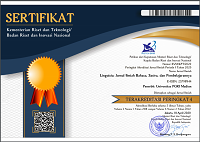Exploring the use of direct corrective feedback on writing an Undergraduate Thesis
Abstract
This study explored the use of direct corrective feedback in the Thesis Proposal writing course where the students are expected to develop their undergraduate thesis proposal at Universitas Brawijaya and how direct corrective feedback can help the students to deal with their academic writing. The data were obtained from six students who have taken the Thesis Proposal Writing course and one lecturer who taught the course using two instruments: an interview guide and observation checklists to triangulate and ensure the validity. The result showed that: (1) direct corrective feedback was employed by the teachers to help the students to deal with their writing because direct corrective feedback was the most suitable and comprehensive feedback (2) the lecturer provided direct corrective feedback through Google Classroom and Google Documents for asynchronous meeting and Google Meet for synchronous meeting (3) Direct corrective feedback helped the students to deal with their writing since the students had high positive attitude and is preferred by the students to revise their drafts. In teaching writing, the result implied that it will be very beneficial for the teacher to provide direct corrective feedback to the students as teaching strategies and the students to correct their drafts easily.
Keywords
Full Text:
PDFReferences
Al-Bakri, S. (2015). Written corrective feedback: Teachers’ beliefs, practices and challenges in an Omani context. In Arab Journal of Applied Linguistics (Vol. 1, Issue 1). http://www.tjaling.org
Ali, S. S., & Ramana, V. L. (2018). Academic writing challenges at Universities in Saudi Arabia and solutions. International Journal of English Language and Humanities, 4(10), 291–298.
Amrhein, H. R., & Nassaji, H. (2010). Written corrective feedback: What do students and teachers think is right and why?. Canadian Journal of Applied Linguistics, 13(2), 95-127.
Aridah. (2016).The Effectiveness of direct and indirect written corrective feedback in EFL writing performance. Proceeding ISELT FBS Universitas Negeri Padang Conference, 105-115.
Ary, D., Lucy Cheser Jacobs, Asghar Razavieh, & C. Sorensen. (2010). Introduction to research in education. Nelson Education, Ltd.
Aseeri, F. M. M. (2019). Written Corrective Feedback as Practiced by Instructors of Writing in English at Najran University. Journal of Education and Learning, 8(3), 112. https://doi.org/10.5539/jel.v8n3p112
Benson, S., & DeKeyser, R. (2019). Effects of written corrective feedback and language aptitude on verb tense accuracy. Language Teaching Research, 23(6), 702–726. https://doi.org/10.1177/1362168818770921
Bitchener, J. (2008). Evidence in support of written corrective feedback. Journal of Second Language Writing, 17(2), 102–118. https://doi.org/10.1016/j.jslw.2007.11.004
Black, D. A., & Nanni, A. (2016). Written Corrective Feedback: Preferences and Justifications of Teachers and Students in a Thai Context. GEMA Online ® Journal of Language Studies, 16(3).
Brown, H. D. (2000). Principles of language learning and teaching (4th ed.). Pearson.
Chuang, P., Susanty, M. T., Silmawati, H., & Effendi, S. (2019). EFL students’ preference in receiving written corrective feedback. Indonesian Journal of Learning and Instruction, 2(2), 23–32. https://doi.org/10.25134/ijli.v2i2.1990
Creswell, J. W. (2012). Educational research: Planning, conducting, and evaluating quantitative and qualitative research (4th editio). Pearson.
Fitrinada, D. A., Bambang A. Loeneto, & Fiftinova. (2018). Students’ Writing Anxiety and Its Correlation With Writing Performance. The Journal of English Literacy Education, 5(2), 194–207.
Elhawwa, T., Rukmini, D., Mujiyanto, J., & Sutopo, D. (2018). The Learners Perceive of Written Corrective Feedback in Writing Multicultural Class.
Ellis, R. (2009). A typology of written corrective feedback types. ELT Journal, 63(2), 97–107. https://doi.org/10.1093/elt/ccn023
Fani, S. (2020). EFL Learners Perception of Written Corrective Feedback.
Ferris, D. R. (2003). Response to student writing: Implications for second language students. Routledge.
Ferris, D. R., Liu, H., Sinha, A., & Senna, M. (2013). Written corrective feedback for individual L2 writers. Journal of Second Language Writing, 22(3), 307–329. https://doi.org/10.1016/j.jslw.2012.09.009
Ferris, D., & Roberts, B. (n.d.). Error feedback in L2 writing classes How explicit does it need to be?
Hamouda, A. (2011). A Study of Students and Teachers’ Preferences and Attitudes towards Correction of Classroom Written Errors in Saudi EFL Context. English Language Teaching, 4(3). https://doi.org/10.5539/elt.v4n3p128
Han, Y., & Hyland, F. (2015). Exploring learner engagement with written corrective feedback in a Chinese tertiary EFL classroom. Journal of Second Language Writing, 30, 31–44. https://doi.org/10.1016/j.jslw.2015.08.002
Harmer, J. (2007). The practice of English language teaching. Pearson Longman.
Hartono, H., Anwar, C., & Murtiningrum, A. (2019). Corrective Feedbacks and Grammar Teaching in a Situated Teaching Context of Process-Based Writing. Register Journal, 12(1), 28. https://doi.org/10.18326/rgt.v12i1.28-48
Hashemifardnia, A., Namaziandost, E., & Sepehri, M. (2019). The effectiveness of giving grade, corrective feedback, and corrective feedback-plus-giving grade on grammatical accuracy. International Journal of Research Studies in Language Learning, 8(1). https://doi.org/10.5861/ijrsll.2019.3012
Hyland, F. (2003). Focusing on form: Student engagement with teacher feedback. System, 31(2), 217–230. https://doi.org/10.1016/S0346-251X(03)00021-6
Hyland, K., & Hyland, F. (2006). Feedback on second language students’ writing. Language Teaching, 39(2), 83–101. https://doi.org/10.1017/S0261444806003399
Jodaie, M., Farrokhi, F., & Zoghi, M. (2011). A Comparative Study of EFL Teachers’ and Intermediate High School Students’ Perceptions of Written Corrective Feedback on Grammatical Errors. English Language Teaching, 4(4). https://doi.org/10.5539/elt.v4n4p36
Leki, I. (1991). The Preferences of ESL Students for Error Correction in College‐Level Writing Classes. Foreign Language Annals, 24(3), 203–218. https://doi.org/10.1111/j.1944-9720.1991.tb00464.x
Listiani. (2017). Students’ Perception toward Teacher’s Written Corrective Feedback in Writing 3 class.
Luan, N. L., & Ishak, S. N. A. (2018). Instructor’s direct and indirect feedback: How do they impact learners’ written performance? In 3L: Language, Linguistics, Literature (Vol. 24, Issue 3, pp. 95–110). Penerbit Universiti Kebangsaan Malaysia. https://doi.org/10.17576/3L-2018-2403-08
Lumetta, H. J. (2004). Feedback for Learners: Effective Techniques and Strategies. University of Illions.
Mohammad, T. F., & Rahman, T. A. (2016). English Learners Perception on Lecturers’ Corrective Feedback. http://www.theartsjournal.org/index.php/site/index
Mollestam, E., & Hu, L. (2016). Corrective Feedback on L2 Students’ Writing. Sweden: Malmö University
Moses, R. N., & Mohamad, M. (2019). Challenges Faced by Students and Teachers on Writing Skills in ESL Contexts: A Literature Review. Creative Education, 10(13), 3385–3391. https://doi.org/10.4236/ce.2019.1013260
Mustafa, R. F. (2012). Feedback on the feedback: Sociocultural interpretation of Saudi ESL learners’ opinions about writing feedback. English Language Teaching, 5(3), 3–15. https://doi.org/10.5539/elt.v5n3p3
Nassaji, H., & Kartchava, E. (2020). Corrective Feedback and Good Language Teachers. In Lessons from Good Language Teachers (pp. 151–163). Cambridge University Press. https://doi.org/10.1017/9781108774390.015
Nation, I. S. (2008). Teaching ESL/EFL reading and writing. Routledge.
Nematzadeh, F., & Siahpoosh, H. (2017). The Effect of Teacher Direct and Indirect Feedback on Iranian Intermediate EFL Learners’ Written Performance. Journal of Applied Linguistics and Language Learning, 2017(5), 110–116. https://doi.org/10.5923/j.jalll.20170305.02
Nunan, D. (2015). Teaching English to speakers. In Teaching english to speakers of other languages -An introduction.
Oshima, A. & Hogue, A. (2007). Introduction to academic English. Pearson/Longman.
Pratiwi, K.D. (2016). Students’ difficulties in Writing English ( A Study at the third semester Ssudents of English Education program at University of Bengkulu Academic Year 2011-2012). Linguistics : Journal of Linguistics and Language Teaching, 3(1), doi: 10.29300/ling.v3i1.106
Rahmatunisa, W. (2014). Problems faced by EFL learners in writing argumentative essay. English Review: Journal of English Education, 3(1), 41–49. http://journal.uniku.ac.id/index.php/ERJEE
Rajab, H., Khan, K., & Elyas, T. (2016). A case study of EFL teachers’ perceptions and practices in written corrective feedback. International Journal of Applied Linguistics and English Literature, 5(1), 119–131. https://doi.org/10.7575/aiac.ijalel.v.5n.1p.119
Russel, J. V., & Spada, N. (2006). The effectiveness of corrective feedback for the acquisition of L2 grammar. In J. M. Norris & L. Ortega (Eds.), Synthesizing Research on Language Learning and Teaching (pp. 133–164). John Benjamins Publishing Company. https://doi.org/https://doi.org/10.1075/lllt.13.09val
Sabarun, S. (2020). Direct Teacher Corrective Feedback in EFL Writing Class at Higher Education: What Students Perceive. Vision: Journal for Language and Foreign Language Learning, 9(1), 17. https://doi.org/10.21580/vjv9i14652
Septiana, A. R., Sulistyo, G. H., & Effendi Kadarisman, A. (2016). Corrective feedback and writing accuracy of students across different levels of grammatical sensitivity. Indonesian Journal of Applied Linguistics, 6(1), 1–11. https://doi.org/10.17509/ijal.v6i1.2642
Sheen, Y. (2007). The effect of focused written corrective feedback and language aptitude on ESL learners’ acquisition of articles. TESOL Quarterly, 41(2), 255–283. https://doi.org/10.1002/j.1545-7249.2007.tb00059.x
Toba, R., Noor, W. N., & Sanu, L. O. (2019). The Current Issues of Indonesian EFL Students’ Writing Skills: Ability, Problem, and Reason in Writing Comparison and Contrast Essay. Dinamika Ilmu, 19(1), 57–73. https://doi.org/10.21093/di.v19i1.1506
Wan Mohd Yunus, W. N. M. (2020). Written corrective feedback in English compositions: Teachers’ practices and students’ expectations. English Language Teaching Educational Journal, 3(2), 95. https://doi.org/10.12928/eltej.v3i2.2255
Article Metrics
Abstract has been read : 654 timesPDF file viewed/downloaded: 0 times
DOI: http://doi.org/10.25273/linguista.v6i1.13056
Refbacks
- There are currently no refbacks.
Linguista: Jurnal Ilmiah Bahasa, Sastra, dan Pembelajarannya indexed by:
View My Stats








